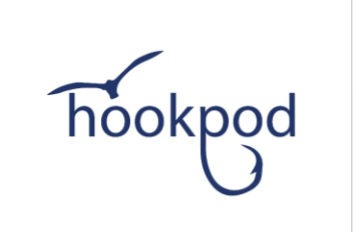 Hookpod Ltd PRESS RELEASE
Hookpod Ltd PRESS RELEASE
Sir David Attenborough backs UK Innovation to save albatrosses and turtles
Globally, an albatross dies on a fishing hook every 5 minutes. Six out of seven marine turtles are threatened with extinction. Thanks to a clever design by UK company Hookpod, there’s now a proven answer. The Hookpod is small in size, big in innovation and will save albatrosses and turtles.
Hookpod are now launching a new project off the coast of Brazil, a seabird and turtle hotspot, to equip five longline fishing boats with Hookpods. This initiative will show that this is the first ever solution to stop both birds and turtles dying in pelagic longline fisheries. Sir David Attenborough has recently backed this project to implement new technology for fishing fleets.
What’s the problem?
By far the biggest threat faced by many albatrosses, other seabirds and marine turtles, is death on longline fishing hooks. As the name suggests, this fishing technique involves very long lines of baited hooks – a single vessel may use a line extending 100 km, from which can hang many thousands of baited hooks.
Every year pelagic longliners fishing for tuna and swordfish set about three billion hooks, killing an estimated 300,000 seabirds every year, of which many thousands are albatrosses. 15 out of 22 species of albatrosses are threatened with extinction. Death in these longline fisheries is the greatest threat to the majority of species. A recent study by Duke University, South Carolina, USA, found that 250,000 loggerhead and 60,000 leatherback turtles are estimated to be inadvertently snared each year by commercial longline fishing. The data was collected from 13 nations with fishing information available. This indicates that global action is necessary to alter the damages of longline fishing.
When baited hooks are set from the stern of the vessel, before they sink they are still visible near the sea’s surface. At this stage, foraging birds and turtles spot them and try to grab the bait before it sinks. They can become hooked, dragged under and drowned. This is obviously bad news for the wildlife, but also for the fishermen, who would rather catch fish.
How Hookpod Works
The Hookpod has been proven to significantly reduce the number of birds and turtles killed in tuna and swordfish fisheries. It achieves this by enclosing the point and barb of the hook as it enters the water, making it impossible for animals to become hooked. The pod has an air pressure mechanism which opens on reaching fishing depth and the baited hook is released to begin fishing. In short it keeps wildlife off hooks, opens underwater and means fishermen can just catch fish.
When the fishing is finished, Hookpods are simply pulled onboard, closed up again and stored along with the hooks and line in standard fishing bins ready to be used again. It’s very durable and long lasting, meaning it’s cost effective for the fishermen.
Sir David says “Every day, hundreds of albatross die in longline fisheries. But there is a unique and exciting new solution to halt this. It’s called a Hookpod. Hookpods cover baited hooks as they enter the water and stop birds getting caught as they dive for baits. They are effective, easy to use, safe and economic for fishermen. If every pelagic longline fishing fleet used Hookpods, I believe we can stop the accidental death of these magnificent ocean wanderers.”
The power of crowdfunding
Following several years of successful trials in Brazil, South Africa, New Zealand and Australia, in many cases with the assistance of the Albatross Task Force, an RSPB team of seabird bycatch reduction instructors, the inventors are now seeking funds via the Crowdfunder UK website to equip five complete vessels in the seabird and turtle hotspot off the coast of Southern Brazil, a known foraging area for albatrosses from the UK Territories of the Falklands and South Georgia.
Working with local charity Projeto Albatroz, the project will not only supply and assist fishermen to use the new equipment, it will provide observers to monitor how the bycatch rates of both birds and turtles are reduced. It could prove that Hookpods are the first ever fishery measure to prevent the accidental capture of several taxa at once.
Hookpod is using the Crowdfunder UK online crowd source funding platform to try and raise £57,000. You can see the project here https://www.crowdfunder.co.uk/hookpod-technology-to-save-seabirds-and-turtles
The project will be online from April 18th until May 17th 2018. Brazilian conservationist and scientist with Projeto Albatroz, Dr Dimas Gianuca says “The Hookpod is the ultimate solution for reducing seabird and turtle bycatch, not only in Brazilian waters, but in longline fisheries around the world. It will be the game changer in the fight against the population declines currently threatening extinction for many species”
ENDS
[registration_form]
Having criticised the RSPB on yesterday’s blog , I unreservably commend them on their involvement in this excellent project over many years.
Well done, Mark, for publicising this.